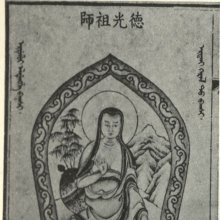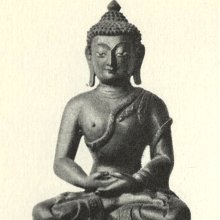Gunaprabha, Guṇaprabha: 7 definitions
Introduction:
Gunaprabha means something in Buddhism, Pali, Hinduism, Sanskrit. If you want to know the exact meaning, history, etymology or English translation of this term then check out the descriptions on this page. Add your comment or reference to a book if you want to contribute to this summary article.
Images (photo gallery)
In Buddhism
Mahayana (major branch of Buddhism)
Source: academia.edu: A Study and Translation of the GaganagañjaparipṛcchāGuṇaprabha (गुणप्रभ) is the name of an aeon, according to the Gaganagañjaparipṛcchā: the eighth chapter of the Mahāsaṃnipāta (a collection of Mahāyāna Buddhist Sūtras).—Accordingly, as the Lord said to the Bodhisattva Ratnaśrī: “Once, son of good family, long ago, countless aeons ago, long and very long before, at that time, the Tathāgata Vimalaprabhānantaraśmirāja, worthy of offerings, the perfectly awakened one, perfect in wisdom and conduct, a Sugata, a knower of the world, a charioteer of human beings to be tamed, unsurpassable, a teacher of gods and men, a Buddha, a blessed one appeared in the aeon called Guṇaprabha, in the universe called Kāyabandhana [...]”.

Mahayana (महायान, mahāyāna) is a major branch of Buddhism focusing on the path of a Bodhisattva (spiritual aspirants/ enlightened beings). Extant literature is vast and primarely composed in the Sanskrit language. There are many sūtras of which some of the earliest are the various Prajñāpāramitā sūtras.
General definition (in Buddhism)
Source: academia.edu: The Chronological History of BuddhismGunaprabha (475-400 BCE) was the native of Mathura. He resided in a monastery named “Agrapuri” (modern Agra) of Mathura. Taranatha erroneously mentions him to be the disciple of Vasubandhu. Most probably, Gunaprabha followed the abhidharma of Vasubandhu. Taranatha mentions that Gunaprabha was the contemporary of King Sri Harsha of Sthanvishvara. In fact, Sri Harsha accepted Gunaprabha as his preceptor. The commentary on the Bodhisattva Bhumi attributed to Gunaprabha mentions him as the preceptor of King Harshavardhana of Sthanvishvara. Taranatha also informs us that a Turushka king Mahasammata was ruling in Kashmir. Sri Harsha built a big monastery in Multan.
Languages of India and abroad
Sanskrit dictionary
Source: Cologne Digital Sanskrit Dictionaries: Edgerton Buddhist Hybrid Sanskrit DictionaryGuṇaprabha (गुणप्रभ).—name of a teacher: Mahāvyutpatti 3486.
Source: Cologne Digital Sanskrit Dictionaries: Monier-Williams Sanskrit-English DictionaryGuṇaprabha (गुणप्रभ):—[=guṇa-prabha] [from guṇa] m. Name of a Buddh. teacher.
[Sanskrit to German]
Sanskrit, also spelled संस्कृतम् (saṃskṛtam), is an ancient language of India commonly seen as the grandmother of the Indo-European language family (even English!). Closely allied with Prakrit and Pali, Sanskrit is more exhaustive in both grammar and terms and has the most extensive collection of literature in the world, greatly surpassing its sister-languages Greek and Latin.
Kannada-English dictionary
Source: Alar: Kannada-English corpusGuṇaprabha (ಗುಣಪ್ರಭ):—[noun] a man renowned for his virtue.
Kannada is a Dravidian language (as opposed to the Indo-European language family) mainly spoken in the southwestern region of India.
See also (Relevant definitions)
Partial matches: Guna, Prabha.
Starts with: Gunaprabhanodgata.
Full-text: Tattvasatyashastra, Dharmamitra, Candramani, Matipura, Sanghadasa, Kayabandhana, Vimalaprabhanantarashmiraja.
Relevant text
Search found 6 books and stories containing Gunaprabha, Guṇaprabha, Guna-prabha, Guṇa-prabha; (plurals include: Gunaprabhas, Guṇaprabhas, prabhas). You can also click to the full overview containing English textual excerpts. Below are direct links for the most relevant articles:
Buddhist records of the Western world (Xuanzang) (by Samuel Beal)
Chapter 10 - Country of Mo-ti-pu-lo (Matipura) < [Book IV - Fifteen Countries]
Chapter 17 - Country of Po-fa-to (Parvata) < [Book XI - Twenty-three Countries]
Maha Prajnaparamita Sastra (by Gelongma Karma Migme Chödrön)
The Udāna-sutta < [Part 2 - Hearing the twelve-membered speech of the Buddha]
Blue Annals (deb-ther sngon-po) (by George N. Roerich)
Chapter 14b - Gyam bzang chos rje (disciple of Zwa ra ba) < [Book 8 - The famous Dakpo Kagyü (traditions)]
Chapter 1 - The first lineage (brgyud pa dang po’i skabs) < [Book 12 - Peace-Making Lineages]
Bodhisattvacharyavatara (by Andreas Kretschmar)
Text Section 40 < [Khenpo Chöga’s Oral Explanations]
A Dictionary Of Chinese Buddhist Terms (by William Edward Soothill)
The Great Buddhist Emperors of Asia (by Shibani Dutta)
Related products

